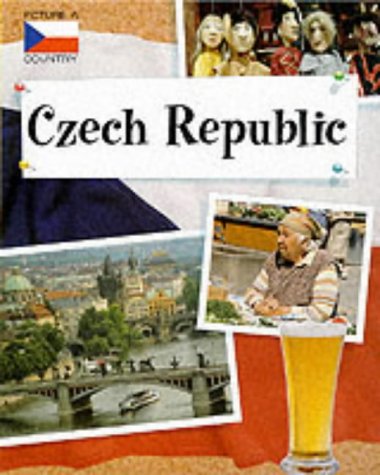-
The Czech Republic
Steven Otfinoski
Hardcover (Facts on File, June 1, 2004)Looks at the history, daily life, politics, and the changes since the decline of communism.
-
Czech Republic
Henry Pluckrose
Paperback (Watts Pub Group, July 31, 2001)None
-
Czech Republic
Jacob Rihosek
Paperback (Hodder Wayland, Feb. 8, 2007)None
-
Czech Republic
Rob Humphreys
Paperback (Hodder Wayland, Sept. 25, 2008)None T
T
-
Czech Republic
Tim Nollen
Paperback (MARSHALL CAVENDISH, March 15, 2006)A great guide for travel within the Czech Republic
-
Czech Republic
Jacob Rihosek, Jenny Matthews
Library Binding (Heinemann/Raintree, Aug. 1, 2004)Presents the natural environment and resources, people and culture, and business and economy of the Czech Republic, focusing on development and change in recent years. U
U
-
Czech Republic
Rob Humphreys
Hardcover (Hodder Wayland, March 30, 2006)Find out about life in different countries and compare the lives of families in a busy urban centre to those living in the countryside. Learn about the landscape and weather, discover what school is like, what people enjoy eating and how the people spend their spare time. Explore the social and economical problems the country is facing and how these affect the lives of ordinary people today and in the future.
-
Czech Republic
Rob Humphreys
Library Binding (Heinemann/Raintree, Feb. 1, 1998)Introduces the geography, economics, and social structure of the Czech Republic, focusing on the city of Brno and the village of Nizkov U
U
-
Czech Republic
Rob Humphreys
Hardcover (Hodder Wayland, July 31, 1997)None
-
Republic.com
Cass R. Sunstein
Hardcover (Princeton University Press, Feb. 18, 2001)See only what you want to see, hear only what you want to hear, read only what you want to read. In cyberspace, we already have the ability to filter out everything but what we wish to see, hear, and read. Tomorrow, our power to filter promises to increase exponentially. With the advent of the Daily Me, you see only the sports highlights that concern your teams, read about only the issues that interest you, encounter in the op-ed pages only the opinions with which you agree. In all of the applause for this remarkable ascendance of personalized information, Cass Sunstein asks the questions, Is it good for democracy? Is it healthy for the republic? What does this mean for freedom of speech?Republic.com exposes the drawbacks of egocentric Internet use, while showing us how to approach the Internet as responsible citizens, not just concerned consumers. Democracy, Sunstein maintains, depends on shared experiences and requires citizens to be exposed to topics and ideas that they would not have chosen in advance. Newspapers and broadcasters helped create a shared culture, but as their role diminishes and the customization of our communications universe increases, society is in danger of fragmenting, shared communities in danger of dissolving. In their place will arise only louder and ever more extreme echoes of our own voices, our own opinions.In evaluating the consequences of new communications technologies for democracy and free speech, Sunstein argues the question is not whether to regulate the Net (it's already regulated), but how; proves that freedom of speech is not an absolute; and underscores the enormous potential of the Internet to promote freedom as well as its potential to promote "cybercascades" of like-minded opinions that foster and enflame hate groups. The book ends by suggesting a range of potential reforms to correct current misconceptions and to improve deliberative democracy and the health of the American republic.Chat with Cass Sunstein in a Message Forum hosted beginning April 1, 2001.
-
The Czech Republic
Robert C. Cottrell, James I. Matray, George J. Mitchell
Library Binding (Chelsea House Pub, Feb. 1, 2005)Looks at the history of the borders in the Czech Republic as a result of political, territorial, and economic disputes, and discusses the Velvet Revolution. Z+
Z+
-
Republic.com
Cass R. Sunstein
Paperback (Princeton University Press, April 14, 2002)See only what you want to see, hear only what you want to hear, read only what you want to read. In cyberspace, we already have the ability to filter out everything but what we wish to see, hear, and read. Tomorrow, our power to filter promises to increase exponentially. With the advent of the Daily Me, you see only the sports highlights that concern your teams, read about only the issues that interest you, encounter in the op-ed pages only the opinions with which you agree. In all of the applause for this remarkable ascendance of personalized information, Cass Sunstein asks the questions, Is it good for democracy? Is it healthy for the republic? What does this mean for freedom of speech?Republic.com exposes the drawbacks of egocentric Internet use, while showing us how to approach the Internet as responsible citizens, not just concerned consumers. Democracy, Sunstein maintains, depends on shared experiences and requires citizens to be exposed to topics and ideas that they would not have chosen in advance. Newspapers and broadcasters helped create a shared culture, but as their role diminishes and the customization of our communications universe increases, society is in danger of fragmenting, shared communities in danger of dissolving. In their place will arise only louder and ever more extreme echoes of our own voices, our own opinions.In evaluating the consequences of new communications technologies for democracy and free speech, Sunstein argues the question is not whether to regulate the Net (it's already regulated), but how; proves that freedom of speech is not an absolute; and underscores the enormous potential of the Internet to promote freedom as well as its potential to promote "cybercascades" of like-minded opinions that foster and enflame hate groups. The book ends by suggesting a range of potential reforms to correct current misconceptions and to improve deliberative democracy and the health of the American republic.Chat with Cass Sunstein in a Message Forum hosted beginning April 1, 2001.